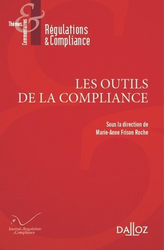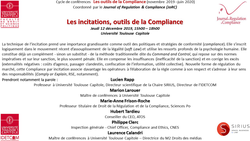Nov. 4, 2021
Publications

► Full Reference: M.-A. Frison-Roche, " Assessment of whistleblowing and the obligation of vigilance regarding international competitiveness", in M.A. Frison-Roche (ed.), Compliance Monumental Goals, series "Compliance & Regulation", Journal of Regulation & Compliance (JoRC) et Bruylant, 2023, p.
____
► Article Summary: Taking up the legal tools of Compliance and confronting them with the concern that Law must have for the Competitiveness of companies, it is necessary that these legal instruments not harm it because Compliance Law, because of its immense ambitions, can only function through an alliance between political wills with great pretensions (save the planet) and the entities which are able to achieve these goals (the crucial economic operators : the political drawing on the compagnies" power, it would be contradictory for the legal instruments put in place by Law to harm the ability of companies to face global economic competition, or worse to favor international competitors acting under legal systems which do not integrate Compliance obligations.
From this principle, it is possible to assess these two legal techniques of whistleblowing and vigilance obligation: both consist in capturing Information, which gives them a strong uniqueness and fits them into the global competition for Information.
Taking the whistleblowing, its first beneficiary is the company itself since the firm discovers a weakness and can therefore remedy it. Therefore, beyond the principle of protection of the whistleblower by their access to the legal statute, for instance the one conceived by the French 2016 law known as "Sapin 2", it is questionable that all the incentives are not put in place so that the holder of such information transmits it to the manager. It is not the European solution, even after the European Directive of 2019, national legal systems continuing to require the absence of financial compensation, the "heroic figure of the whistleblower and the refusal of their remuneration depriving the company of Information and improvement. First to the manager, with external transmission taking place if the latter does nothing, the internal manager is thus encouraged to act and put an end to the dysfunction, which increases the competitiveness of the company.
But the French legislation has on the contrary developed the right incentive as to the person to whom the information is transmitted because by obliging to transmit first to the manager, the external transmission intervening if the internal management does nothing, the incentive is thus made to the internal manager to act and put an end to the dysfunction, this legal solution increasing the competitiveness of the company.
Even more, and even if it seems counter-intuitive, the obligation of vigilance increases the competitiveness of the obliged companies. Indeed, Law by obliging them to prevent and fight against violations of human rights and the environment has tacitly given them all the necessary powers to do so, notably the power to collect Information on third-party companies, including (and even above all) those which are not subject to transparency obligations. In this respect, companies, as far as they are personally responsible, hold supervisory power over others, a power which allows to globalize Compliance Law and which, in the process, increases the Companies' own power. Therefore, the obligation of vigilance is in many respects a boon for the companies which are subject to it. The resumption of the mechanism by the next European Directive, itself indifferent to the territory, will only strengthen this global power of vigilant companies over possibly foreign companies which become its passive subjects.
____
🚧 read the bilingual Working Paper, basis for this article
____
____
► read the presentations of the other Marie-Anne Frison-Roche's contributions in this book:
📝Compliance Monumental Goals, beating heart of Compliance Law,
📝Definition of Principe of Proportionality and Definition of Compliance Law,
📝 Role and Place of Companies in the Creation and Effectiveness of Compliance Law in Crisis,
__________
April 21, 2021
Thesaurus : Doctrine

► Full Reference : L. Rapp, "Théorie des incitations et gouvernance des activités spatiales" ("Incentive Theory and Governance of Space Activities"), in M.-A. Frison-Roche (ed.), Les outils de la Compliance, coll. "Régulations & Compliance", Journal of Regulation & Compliance (JoRC) and Dalloz, 2021, p. 73-88.
____
📕read a general presentation of the book, Les outils de la Compliance, in which this article is published
____
► Summary of the article (done by the author): The article studies the conditions for an application of the theory of incentives to the problems currently posed by the governance of space activities. These activities have been enriched by the presence of numerous private operators, without the market that is being set up having yet been properly regulated. The accumulation of debris in close space highlights the difficulty of maintaining a situation where only national laws govern in the absence of a specialized international organization and in the insufficiency of the international treaties in force. This article shows the contributions of the behavioral approach in Law and economics and the interest that there would be in developing it.
________
April 21, 2021
Publications

► Full Reference: M.-A. Frison-Roche, "Compliance et incitations: un couple à propulser " ("Compliance and incentives : a promising tandem"), in M.-A. Frison-Roche (ed.), Les outils de la Compliance, coll. "Régulations & Compliance", Journal of Regulation & Compliance (JoRC) and Dalloz, 2021, p. 123-130.
____
📝read the article (in French)
____
🚧read the bilingual Working Paper which is the basis of this article, with more developments, technical references and hypertext links
____
📕read a general presentation of the book, Les outils de la Compliance, in which this article is published
____
► Summary of the article (done by the Journal of Regulation and Compliance): The theory of incentives targets the mechanisms which do not use directly constraint (except to present sanctions themselves as incentives) but which leads nevertheless to expected behaviors. To appreciate the links which must or must not be done between incentives and Compliance, we should proceed in two times.
First, the association appears natural between incentive mechanisms and "Compliance Law" since the later is defined in a dynamic way. Indeed, if it is defined placing its legal normativity in its "monumental goals", as the end of corruption, the detection of money laundering in order to underlying criminality disappears, or as the effective protection of environment or the concrete care of human beings, then what matters is not the means in themselves but the effective tension towards these "monumental goals". In this perspective, what was related to public policies led by States, because they are definitively not able to do it, the charge is internalized in the firms which are able to tend towards this goals: "crucial operators" because they have the geographical, technological, informational and financial means.
In this perspective, the internalization of public willingness provoking a split with the concept of State linked to a territory which deprives Politics of its constraint power, incentive mechanisms appear as the most efficient mean to reach these monumental goals. They appear as this "natural" mean both negatively and positively defined. Negatively in which they do not need in Ex Ante institutional localizable sources and sanction power in Ex Post: it is enough to substitute the interest to obligation. Positively, incentives relay through operators' strategies what was the so critical and joked form of public action: the "plan". The duration is thus injected thanks to Compliance mechanisms, as we can see it through the development of it in the care for environment ("plan climat") or through the educational mechanism, which could be conceived only in duration.
However, the opposition seems radical between Compliance Law and Incentives. And this because of three convictions often developed and that we have to overcome. First, the idea that in a general way, there would be a Law only if there is a mechanism of immediate constraint which is associated to the norm. As long as the incentive is not based on obligation, then it will be nothing... Secondly, and as if that were a kind of consolation ..., Compliance would not be really Law either ... We so often say that it is only about a methodology, a range of processes without sense, procedures to follow without trying to understand, process that algorithms integrate in a mechanic without end and without sense or that on the contrary, Compliance would be full of sense by Ethics and Morality, which are far from Law. While incentives talk to the human spirit which calculate, Compliance would be so a process through which machines will be connected to other machines, so an extra soul, where calculation has no place... Thirdly, solutions would be to be find in Competition Law because it can do without States, submit them and approach what is a-sectorial, especially finance and digital, the world being financialized and digitalized. The violence of Competition Law which comes in Ex Ante thanks to "Compliance sanctions" applying for example to essential infrastructures Law, by continuing to deny the salience of the duration and taking care of the "market power" would be also not compatible with a marriage with incentive mechanisms which rely on duration and power of those to which it is applied, converging towards goals, which are set by what Competition Law ignores: the project. This project which pretends to build the future is the one of politics and of companies, which use their deployed power in time to concretize it. It is without any doubt there that the future of Europe is.
To overcome this triple difficulty, it is thus necessary, in a second time, to modify our conception of Law, especially thanks to Compliance Law, in which this new branch is autonomous from Competition Law, and even sometimes opposed to it, in order to the insertion of incentive mechanisms permit to unknown or against Competition Law organizations to reach "monumental goals" which are imperative to take into consideration. For example, the taking into consideration of climate challenges or the building of a sovereign identity of the data. This is expressly set by European Commission which supervises such initiatives, supervision being what is articulated with Compliance, in a couple that go beyond Regulation, and replaces in Ex Ante Competition Law, salient branch for Ex Post. All the texts which are in the process of expressing it are based on this reformed couple: Compliance and Incentive.
This couple supposes that we recognize as such the existence of companies as project carriers, project which is the creation of marketed wealth circulating on a market, which could be an industrial project specific to a geographical zone both economical and political. Regulation is deployed to go away from the notion of sector and to transform itself in supervision of crucial firms in the correspondance between the project and the action, what refers to the notion of "plan". In this, banking supervision is just the advanced bastion of all thematic, energetic, climatic and health plans, or more broadly industrial and technological that could by incentive be implemented, this conception of Compliance permitting to build zones which are not reduced to immediate market exchange. The incentive corresponds to the fact that Compliance Law relies on the power of the firm to reach its own political goals, for example fighting against disinformation in the digital space or obtaining a healthy environnement. This supposes that Compliance stops to be only conceived as a model of rules effectivity, for example of Competition Law, to be recognized as a substantial branch of Law. A branch which expresses political goals. A branch which is anchored in crucial firms whose it recognizes the autonomy with regards to markets. This makes it possible, in particular through the coupling with incentive mechanisms leading to long-term collaborative operations supervised by public authorities, not to be governed by simple Competition Law, inapt to bring projects to fruition.
________

Updated: Dec. 21, 2020 (Initial publication: Dec. 11, 2019)
Publications

This working document serves as the basis for two conference given in the symposium made under the direction of Lucien Rapp, Les incitations, outils de la Compliance ("Incitations: Compliance Tools").
Référence : Frison-Roche, M.-A., Compliance et Incitations : un couple à propulser, in Faculté de droit de l'Université Toulouse-Capitole, et Journal of Regulation & Compliance (JoRC),Les incitations, outils de la Compliance, 12 décembre 2019, Toulouse.
This Working Paper has been the basis for two conferences in the colloquium in Toulouse (France) under the scientific direction of Lucien Rapp, about Les incitations, outils de la Compliance ("Incitations, as Compliance Tools"), on December 12, 2019, the first one about The sanction as incitation and the second one about Incitations and Compliance Law (synthesis of this colloquium). sur le thème de la sanction comme incitation, la seconde en synthèse de ce colloque sur
After it has been the basis for the article, to be published in the books Les outils de la Compliance and Compliance Tools in the Series Régulations & Compliance.
Read a general presentation of this book.
____
Summary of this Working Paper: Compliance and Incentives appear at first glance to be totally opposite. Not only because sanctions are at the heart of Compliance and that sanction is associated with constraint while incentive is associated with non-constrained
To do this, the concept of “incentive Compliance” should be developed. This concept is not only appropriate, but it is necessary in a new conception of Sovereignty. For example for the digital Europe.
_________
Read the developments below.
Voir cette question analysée d’une façon autonome, Frison-Roche, M.A., Résoudre la contradiction entre « sanction » et « incitation » sous le feu du Droit de la Compliance, 2020.
Dec. 18, 2019
Publications

Référence complète : Frison-Roche, M.-A., Le maniement de la propriété intellectuelle comme outil de régulation et de compliance, in Vivant, M. (dir.), Les Grands Arrêts de la propriété intellectuelle, 3ième éd., 2019, 9-11, p.43-53.
This contribution is written in French.
Summary:
Intellectual Property, which comes from the State and is incorporated into public policy, can be designed not to reward the creator a posteriori, but to encourage others to innovate. It is then an Ex Ante regulatory tool, an alternative to the subsidy. If private copying is an exception, it is not in relation to the principle of Competition but in an insertion into a system of incentives, starting from the costs borne by the creator of the first innovation: the rights holder is then protected , not only according to a balance of interests involved but in order not to discourage innovative potentials and the sector itself. (1st decision) ;
The sectoral policy then permeates Intellectual Property, used to regulate a sector, for example that of the drug. While it is true that a laboratory wishing to market a generic drug did not wait for the expiration of the patent for the original drug to do so, it is however not relevant to sanction this anticipation by a few days because the investments made by the holder of the Intellectual Property right have been made profitable by this one and because the public authorities favor the generics in a concern of public health (2nd decision).
Systemic interest prevails and therefore Internet service providers have to bear the costs of blocking access while they are irresponsible because of the texts. This obligation to pay is internalized by Compliance Law because they are in the digital system best able to put an end to the violation of Intellectual Property rights which the ecosystem requires to be effective. (3rd decision).
Read the contribution (in French).
______
Dec. 12, 2019
Conferences

Référence : Frison-Roche, M.-A., La sanction comme incitation dans les techniques de compliance, in Faculté de droit de l'Université Toulouse-Capitole, Journal of Regulation & Compliance (JoRc),Les incitations, outils de la Compliance, 12 décembre 2019.
- Lire la présentation générale du cycle de conférences, consacré au thème Les outils de la Compliance
- Lire la présentation de l'ouvrage qui sera publié ultérieurement
- Lire la présentation de la collection Régulations & Compliance dans laquelle l'ouvrage sera publié
Résumé de la conférence
La Compliance ne se réduit pas à une méthode d'efficacité du Droit. Sinon il convient de l'appliquer à toutes les branches du Droit, ce que l'on ne fait pas. Mais même substantiellement défini, en ce qu'il est un prolongement du Droit de la Régulation, internalisé dans des "opérateurs cruciaux", délié ainsi de la détermination préalable d'un secteur, il conserve la nature téléologique de celui-ci. Le Droit qui est aussi un outil ne devient plus alors que cela, puisque la norme est placée dans le but.
Le renversement du traitement juridique de la matière pénale par la théorie appliquée des incitations
On observe très souvent que le Droit de la Compliance a pour cœur des sanctions, auxquelles Droit, dans son exercice inhérent de qualifié, donne le nom qui correspond à la chose : la "matière pénale". Logiquement, comme pour le droit pénal, qui n'est que la forme juridique de la matière pénale, le régime juridique devrait être le même que le Droit pénal. Mais il n'en est rien en raison de l'application de la théorie des incitations. De cela, les juristes et les juges n'en reviennent pas et c'est pourquoi il y mettent des limites que les tenants de la théorie des incitations n'admettent pas. Cela ne tient pas de la simple technique, de tel ou tel cas, mais de l'opposition de fond. En effet, pour le Droit pénal, celui-ci a vocation à être "autonome" dans le système juridique, c'est-à-dire développe des notions et des régimes qui lui sont propres parce qu'il est une exception légitime au principe de liberté auquel il rend par essence hommage et ne saurait se définir autrement, tandis qu'insérée dans la notion "d'incitation" la technique de la sanction n'intègre en rien cela et se contente d'emprunter à l'efficacité de la dureté pénale pour rendre efficace la règle sous-jacente ainsi dotée, la sanction étant ainsi et par un semblable effet de nature dans une parfaite dépendance. Il y a donc à première vue opposition de fond entre "sanction" et "incitation" alors qu'intuitivement frapper fort est si "commode et dissuasif" lorsqu'on veut obtenir d'une entreprise tel ou tel comportement..
En effet, certes la perspective d'une sanction en Ex Post en cas de manquement est la meilleure incitation à l'obéissance en Ex Ante à la norme d'interdiction et de prescription. C'est pourquoi le droit financier le plus libéral est également le plus répressif, l'analyse économique du droit conduisant à calculer des normes qui amènent l'agent à ne pas avoir intérêt à commettre un manquement. A l'obéissance se substitue l'intérêt. Le Droit de la concurrence et le Droit des marchés financiers en sont à ce point familiers que certains ont douté de la juridicité.
Mais cela produit aussi des chocs en retour très importants, dans une méconnaissance assurée des principes, pourtant de valeur constitutionnelle, constituant la base de la matière pénale. On peut en dresser la liste :
- des sanctions qui ne sont plus l'exception mais l'ordinaire, le cœur dans les régulations des marchés et le droit des entreprises supervisées, contraire aux principes économiques libéraux
- des sanctions d'autant plus élevées qu'elles sont négociables en échange de ce que veut la puissance publique : ainsi la pénalisation n'exclut en rien la contractualisation, au contraire elle en est un sous-outil entre les mains de l'autorité administrative ou politique de poursuite
- des sanctions qui sont conçues indépendamment des principes procéduraux, le couple "droit pénal/procédure pénale" perdant son intimité
- des sanctions qui sont échangées contre des preuves (programmes de clémence, qui sont des outils de Compliance)
- des sanctions qui ne sont pas arrêtées par le temps : application immédiate et rétroactivité dans le temps
- des sanctions qui ne sont pas arrêtées par l'espace : extraterritorialité de l'application des sanctions
- des sanctions contre lesquelles, la matière pénale étant indissociable de la façon de les appliquer ("Procédure pénale") les entités aptes à en répondre devant justifier leur comportement et non être présumées conformes dans celui-ci
- des sanctions qui se cumulent pour un même fait si cela est efficace ;
- l'abandon des notions classiques d'intentionnalité et de causalité, puisque le raisonnement est fonctionnel et non causal.
Cela est-il admissible ?
Non car en premier lieu dans une conception classique du Droit pénal c'est une succession de principes constitutionnels qui sont méconnus et les juges vont bloquer un Droit de la Compliance dont le seul principe serait l'efficacité : le Droit ne peut être un seul "outil d'efficacité", sauf à n'être plus le Droit. Le Droit pénal est un outil d'inefficacité parce qu'il se définit comme une exception légitime à la liberté des êtres humains et donc le gardien de ce principe de liberté, ce qui est étranger à la théorie des incitations, mais lui est supérieur et bloque les effets déroulés par celle-ci.
Non car en second lieu dans une conception trop étendue de la Compliance, consistant à l'appliquer à toutes les règles dont on voudrait qu'elles soient effectives parce que celui-ci qui les a émises le veut, ce qui voudrait pour toutes les règles, même celles qui ne sont pas d'ordre public. Dans une telle "passion pour la Réglementation" mettant fin au libéralisme et au Droit, les sanctions permettent à une Autorité publique d'imposer en Ex Ante avec l'accord des intéressés ce qu'il veut, comme on peut le voir en Asie, la répression passant en Ex Ante se transformant en rating et obtention volontaire d’obéissance pour toute prescription.
Oui si l'on définit correctement le Droit de la Compliance dans un seul lien avec des "buts monumentaux" qui seuls peuvent justifier la violence des mécanismes de sanction, en tant qu'il est le prolongement du Droit de la Régulation. La Régulation de l'économie est plus que jamais nécessaire, alors que les Etats n'ont plus de prise. Par l'internalisation dans les entreprises, si des "buts monumentaux" sont visés et contrôlés, alors le caractère restrictif de la matière pénale passe de l'outil au but : seuls les buts monumentaux peuvent justifier tous les effets précédemment décrits, mais ils le justifient.
L'enjeu est donc de redessiner le principe restrictif des sanctions non plus en celles-ci mais dans le but de Compliance servi par celles-ci. Par ce passage de la conservation de la nature restrictive de la sanction, non plus dans l'outil-même de la sanction mais dans le but servi par celle-ci. Non pas n'importe quelle règle, comme dans certains pays, non pas toutes les règles de ce que l'on appelle d'une façon trop extensive la Compliance, qui est juste le "fait d'obéir aux normes applicables".
Ainsi et par exemple, l'application extraterritoriale de normes nationales répressives adoptées dans un seul but national (embargo) est inadmissible et doit être rejetée par les Tribunaux, alors que cette même application extraterritoriale de normes pour lutter contre le blanchiment d'argent est admissible et pratiquée par tous. Suivant la nature du risque combattu, le terrorisme par exemple, le régime de la sanction est ou n'est pas légitime.
D'une façon plus générale, les "buts monumentaux" qui donnent au Droit de la Compliance sa définition substantielle, alors que beaucoup réduisent encore la Compliance à une simple méthode d'efficacité, voire n'y voient rien de juridique, permettent de distinguer là où la sanction doit être un outil plus ou moins violent pour atteindre le but en raison de la légitimité de celui-ci, du phénomène caché qu'il s'agit de combattre (par exemple terrorisme ou blanchiment) ou du caractère global (par exemple risque environnemental).
____________
Dec. 1, 2016
Thesaurus : Doctrine
Référence complète : Souty, F., Entreprises, concurrence, conformité : définition empirique de la compliance, RLC, 2016, n°55.
Les étudiants de Sciences Po peuvent lire cet article via le drive dans le dossier "MAFR - Régulation & Compliance"
Updated: July 31, 2013 (Initial publication: Nov. 8, 2011)
Teachings : Les Grandes Questions du Droit, semestre d'automne 2011

Dec. 14, 2011
Thesaurus : Soft Law
Lire la réponse faite par EDF, publiée par l'Autorité de la concurrence
La réponse qui émane du service juridique d'EDF est très réservée.
Elle rappelle que le respect du droit de la concurrence est une obligation légale.
June 24, 2008
Conferences

Référence : Frison-Roche, M.-A., Vision juridique de la crise des subprimes, Caisse des dépôts et consignations, 24 juin 2008.
Le droit a une grande part dans la crise en cascade des subprimes, et non pas tant par absence de droit, qui caractériserait le libéralisme nord-américain, que par excès de droit, les contraintes du crédit immobilier pousser les agents à des comportements déviants.
A cela, se sont ajoutés des incitations perverses liées au droit nord-américain des faillites, qui poussent les particuliers à prendre des risques sans limites, que ce que le droit européen entrave.
Enfin, le marché immobilier nord-américain ne connaît pas l’institution publique du notaire, ce qui expose d’autant plus les personnes et les marchés aux catastrophes.